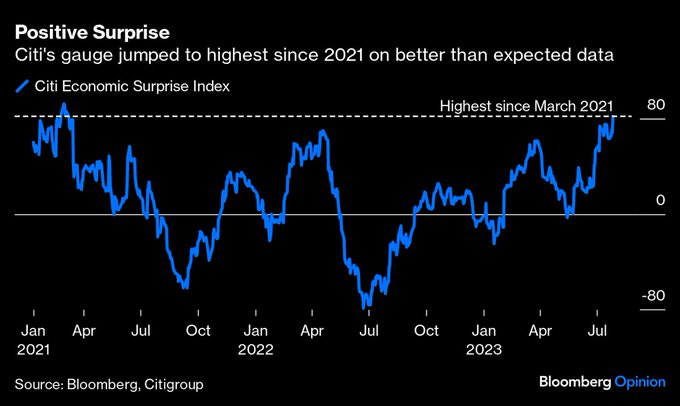A year ago, the consensus view was that a recession was imminent. However, the situation has taken a complete turn, and now most of the evidence suggests that the economy is thriving. Despite the Fed’s efforts to slow it down, the economy keeps on rolling.
The Citi Economic Surprise Index is currently at its highest level in three years, while companies are reporting strong earnings. Inflation is on the decline, which has contributed to rising consumer confidence.

Though there aren’t many signs pointing to an impending recession, there is one indicator with a perfect track record that is- the inverted yield curve. Short-term interest rates have been higher than long-term rates for 55 consecutive weeks since last July.

They call it “inverted” because this is not the way interest rates are supposed to work. There is much more uncertainty going out 10 years versus 2, and therefore you would expect to be compensated for the greater uncertainty, amongst other things. When the opposite is in place, as it is today, some funky things are happening with forward expectations for both inflation and interest rates. And yes, every time this has happened, a recession has followed. But, and this is a big but, we don’t know if it will happen this time, and more importantly, we can’t know how the market will react.
Maybe we do get a recession and the market tanks, or maybe the market already tanked in anticipation of a recession that never came, and is rebounding in anticipation of growth accelerating.
I’ll give the final word to Cullen Roche, who provides valuable insights on why the yield curve in and of itself is not a great predictor of a recession. Here’s what Cullen said with respect to the investing implications of an upside-down curve:
You don’t want to think of the economy and the markets as an on/off switch. If you look at an indicator like the YC that’s inverted you might conclude that you need to flip the switch off on your stock positions. This sort of binary thinking is more like gambling than anything else, but great investors don’t think in binary terms. They think in probabilistic terms. And one thing we know from inverted yield curves is that they tend to occur around periods of rising economic and market risk. This means it might make sense to reduce stock market risk, but it isn’t a siren that tells you you need to jump into your bunker.

